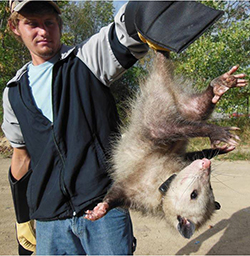For any high school freshman who’s ever sat in class and wondered “When am I going to use this in my life?,” Taylor Root feels your doubt. The 2010 Grandville High graduate’s response: “I was in the same situation when I was in high school. Trust me, you will.”
Root recently spoke to six groups of biology students — about 200 freshmen — about the path his life has taken since high school and how it relates to what they are learning right now.

Root is a graduate student in wildlife biology who has been all over the world studying species including the Virginia opossum, tree swallow, Bachman’s sparrow, greater prairie chicken and quail, just to name a few. He studies biology and animal behavior at the University of Mississippi, and has worked for the North Carolina Wildlife and Resources Commission and the World Parrot Trust, among other organizations.
This was the second year Root spoke to Grandville High School students. His younger brother Travis also is a Grandville grad, and still-younger brother Jordan is currently a student. Root was invited by teacher Peggy Slattery, who said, “We think he has some great perspective on the importance of both education and experience, and because his research is a fantastic example of just about everything we have learned about in class this year.”

The self-described “bird nerd” detailed his work for students, who this year are delving into ecology and species evolution. In an assignment after his talk, they were to show the ways his work intersects with their studies by using as many vocabulary words and concepts as possible, such as what it means for a species to be threatened and why it is a problem from an ecological perspective.
A few years ago, while living in Bolivia to study the endangered blue-throated macaw, Root developed an illness that nearly took his life.
“Why in the world would I almost die to help save the macaw?” he asked students. “Because every single species has a very important role in the ecosystem, and you may never know that role until it’s too late. And it could very well impact us. Us humans.”









